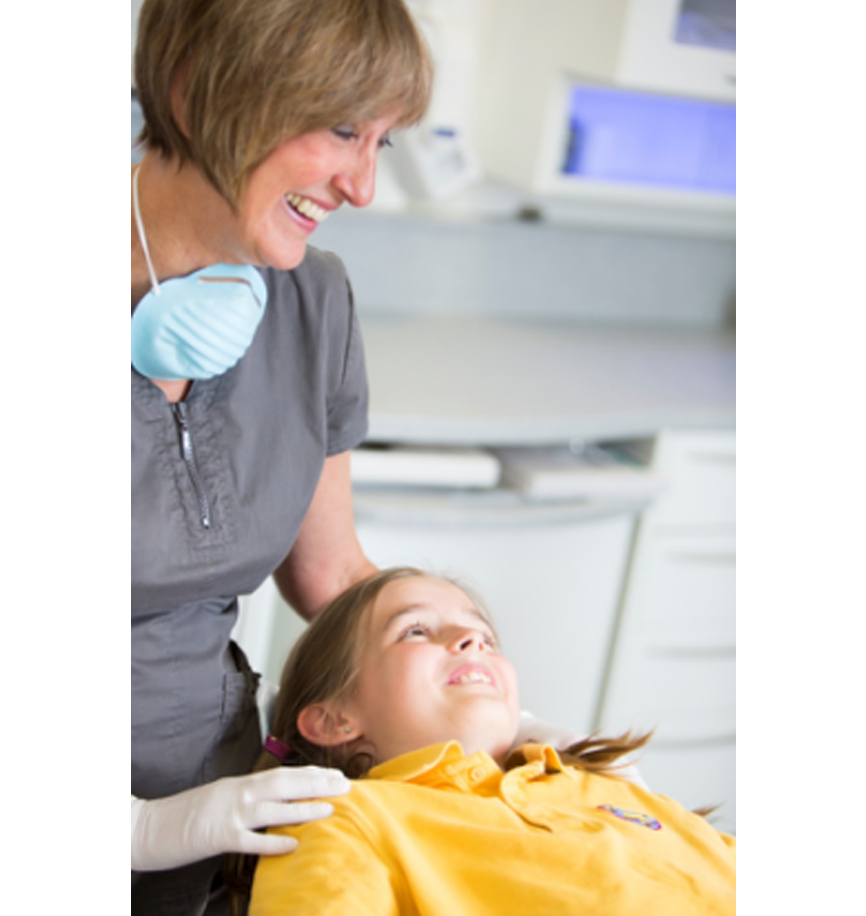Looking after our children’s teeth

We are often asked, by new mums and dads, when is the best time to start bringing their baby to the dentist? We generally say to book them in when their first baby teeth appear. However, it is also good to get babies and young children familiar with the surrounding environment so bringing them to yours or their siblings appointments is a good idea as they get to watch what’s going on.
All too often we hear parents saying to their child ‘don’t be scared, it won’t hurt’ when they never thought it would in the first place but now they have it in their heads that coming to the dentist is scary! Dentistry has moved on. It’s not like it used to be. It’s really important that children see coming to the dentist as a positive experience. One of the main causes of dental phobia is due to a negative experience in childhood. We want our child patients to look forward to coming and seeing us, showing us their new teeth and how well they have been brushing them!
Depending on the child the first few appointments may just be a ride on the moving chair, or a quick smile to show their teeth and choose a sticker! Be guided by your dentist.
As your child grows older and gets used to coming to see us, your dentist may offer preventative treatments such as fluoride varnish or fissure sealants.
We also look at the growth and development of your child’s teeth and if necessary we will refer them to the orthodontist who we work closely with.
So how can a parent help their child look after their teeth?
- Bring your child to the dentist at regular intervals once their baby teeth have started to erupt.
- Introduce a toothbrush as soon as the first tooth appears. Children have smaller mouths than adults so choose a child sized toothbrush and use a pea sized amount of toothpaste.
- Encourage your child to spit, not rinse. We want to keep the fluoride on the teeth to continue protecting them, not wash it away.
- We recommend that parents brush their children’s teeth ideally until the age of 7 and then that they are supervised for the next couple of years.
- Watch your child’s consumption of sugary food and drinks. Sugar feeds the bacteria that cause dental decay. We are seeing more and more articles in the news about children having to have teeth extracted due to decay caused by the frequent consumption of sugar and often hidden sugars. As parents we are encouraged to give our children 5 portions of fruit and veg per day. One easy way is to give them a fruit juice drink or a smoothie but this is one of the biggest culprits in tooth decay! We can’t expect everyone to stop giving children sweets and other sugary treats but we can advise parents to give them at meal times rather than grazing or sipping throughout the day. The government’s sugar smart app is a good way of monitoring how much sugar is in different foods. It can be quite surprising.
- Wait an hour after meals before brushing teeth. This is because the sugar in the food causes an acid attack on the teeth which softens the enamel for up to an hour. Brushing when the enamel is soft makes things worse. If your child has fruit juice and sugary cereals for breakfast and you don’t have an hour to wait before going to school for example, you are actually better to brush teeth before breakfast.
Some people believe that because their children will lose their baby teeth that they don’t need to worry too much about looking after them. This isn’t true. The habits your child forms at an early age will continue into later life. Severe decay in baby teeth can cause abscesses that can harm your child’s developing adult teeth. Also if baby teeth have to be extracted, children are more likely to develop crooked teeth, as the baby teeth help to maintain the right spacing.
If your child hasn’t seen a dentist recently please do give us a call and book an appointment. We generally like to see children on a six monthly basis.
Go Back


